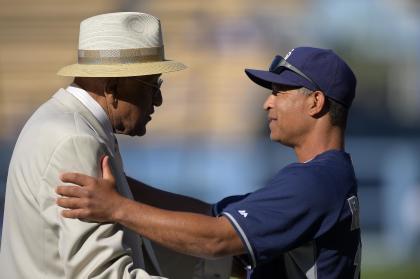Dave Roberts is the definition of what a Dodger is today
My kid, as all kids in Los Angeles eventually get around to, once inquired, “Dad, what’s a Dodger?”
That’s the baseball team here, son.
“No, I mean, what’s a ‘Dodger?' ”
Ah. Like Jazz in Utah. The Lakers here. Or, maybe, what’s a Knickerbocker? Are there really Braves in Atlanta?
It’s a person who, uh, dodges. Trolleys, back in the day. Now, it would seem, stability. Consistency.
Since the last championship, eight managers have come, including, expected as of Monday, Dave Roberts. Seven have gone. Five general managers, not including Tommy Lasorda, but including Andrew Friedman/Farhan Zaidi. Four ownership groups, not including Major League Baseball, which covered the time between Frank McCourt and the Guggenheim posse.
That’s over 27 years, but still, with every owner, every general manager, every field manager came new ideas, new directions, new players, new commitments to “doing it the right way” and fresh fawning over a tradition that was in the process of being paper-cutted into mediocrity.
So, what’s a Dodger? Depends on the day. Depends on who’s doing the talking. Depends on who’s driving the trolley.
Today it is ownership that pushed payroll to $300 million, which made Dodgers fans very happy until they learned the cost of that was watching the Dodgers play baseball on their televisions. It is the very bright and agile Friedman, who pulled a thread on a 94-win team that had lost in the division series and ended up with a handful of 92-win teams that lost in the division series. It’s a roster that looks good in spots, not so good in others, so like most rosters, if not exactly what you’d expect for $300 million. There’s stuff you might reasonably assume for that kind of investment, stuff such as runs and pitching depth, but you don’t always get what you pay for, and rarely do you get what the last guy paid for.
Where exactly the Dodgers went wrong for the past three decades doesn’t matter as much anymore as fixing it for the coming decade or so, but they’ll settle for the next few years, which is where Roberts comes in.
When Don Mattingly sort of quit or was fired-ish or something and ended up in Miami after a breathtakingly brief negotiation, the opportunity arrived for Friedman to align the baseball ops chain of command. It led him eventually to Roberts, at the end above Gabe Kapler, and along the way through the likes of Bud Black, Kirk Gibson, Darin Erstad, Tim Wallach, Bob Geren, Dave Martinez and whomever else paraded in front of the Guggenheim crew.

This is where we learn that Mattingly was pretty good at this, that the clubhouse was for most of his time as manager a swamp of satisfied egos, only a few of whom could get a big out in the seventh or eighth inning. Roberts could be good at it, too, but the Dodgers didn’t go home early every October because of Mattingly, who, just checking here, yes, also ran the Dodgers from April to October every year, and won the NL West three times running. It was the talent, you’d say, which presumably was the same talent that outscored only the Marlins and the Braves in the second half last season and then hit .238 in the playoffs.
Anyway, along comes Roberts to steer a team still in transition, that’s sorting through the pains of roster turnover, annual October meltdowns and a keen sense that whatever’s happening now is the midway point between what Friedman found when he arrived and what he really wants it to look like. Maybe Mattingly’s message ran dry after five years, and in the end he did not appear to be particularly happy. Maybe that was his public face, or his end-of-the-season trudge, or the realization that his new bosses had a different idea about what makes a winning ballclub. Roberts presumably was chosen not only for his baseball acumen, his leadership skills and his charming personality, but also because all of that fit with what Friedman and Zaidi are thinking.
He’s a good man, Dave Roberts. He’s an optimist. He knows his baseball. He is the son of an African-American Marine and a Japanese-American mother. He is a cancer survivor. He was a ballplayer, the kind who made do with just enough skill and an extra helping of heart. If this all runs through the finish line, he’ll be the Dodgers’ first minority manager. He hasn’t managed before, but he has lived before. And, hell, what’s the point of the former if there’s been none of the latter?
And that’s what a Dodger is today.

 Yahoo Sports
Yahoo Sports 
